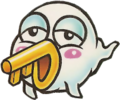Keyzer
| Keyzer | |
|---|---|
 Artwork from Wario Land 4 | |
| Species | Ghost |
| First appearance | Wario Land 4 (2001) |
- “He looks like a pushover... Too bad he's not an enemy! I'm out here risking my life and he just sleeps all day! Hey! Keyzer! You'd better wake up and smell the coffee or I'm to smack you one real nice!!”
- —Wario, Wario Land 4 North American instruction booklet
A Keyzer,[1] sometimes referred to as a Ghost Key,[2] is a small levitating creature in Wario Land 4. It bears some resemblance to a Boo, although with a key for a nose. A Keyzer appears in all 18 stages, always found asleep at first, but when approached, the Keyzer wakes up and follows Wario until he either loses all his health or exits the level via the vortex. The Keyzer then unlocks the sealed door that leads to the next stage and disappears upon doing so. Once the door is unlocked, the Keyzer cannot appear in the same stage again. If Wario exits a stage without finding the Keyzer, he cannot continue to the next stage. Wario can reenter any stage where the Keyzer has not been found. In Crescent Moon Village, a ghost enemy shows an interest in a Keyzer, which it repeatedly tries to steal from Wario. The ghost's movement becomes faster after stealing the Keyzer, which may make it difficult for Wario to catch him, though the Keyzer can be recovered by touching the ghost.
A Keyzer also appears in volume 28 of Super Mario-kun, on the page showing the chapter's end.
Gallery
Keyzer, as seen in a chapter's end of Super Mario-kun
Names in other languages
| Language | Name | Meaning | Notes |
|---|---|---|---|
| Japanese | カギのはし[3] Kaginohashi |
A portmanteau of「カギ」(kagi, "key") and「鴨の嘴」(kamonohashi, "platypus") | |
| Chinese (simplified) | 钥匙怪[4] Yàoshi Guài |
Key Ghost | |
| French | Keyser[5] | - | |
| German | Keyzer[6] | - | |
| Italian | Pellichiave[7] | From pellicano ("pelican") and chiave ("key") | |
| Spanish | Dormillave[8][9] | From dormir ("sleep") and llave ("key") | |
| Pájaro Llave[9] | Key Bird |
References
- ^ 2001. Wario Land 4 European instruction booklet. Nintendo of Europe (British English). Page 23.
- ^ Fall 2001. Nintendo Power Advance Volume 3. Nintendo of America (American English). Page 53.
- ^ 2001. Wario Land Advance: Yōki no Otakara instruction booklet. Nintendo (Japanese). Page 33.
- ^ 瓦力欧寻宝记. iQue (Simplified Chinese). Retrieved June 26, 2024.
- ^ 2001. Wario Land 4 instruction booklet. Nintendo of Europe (French). Page 63.
- ^ 2001. Wario Land 4 instruction booklet. Nintendo of Europe (German). Page 43.
- ^ 2001. Wario Land 4 instruction booklet. Nintendo of Europe (Italian). Page 123.
- ^ 2001. Wario Land 4 instruction booklet. Nintendo of Europe (European Spanish). Page 103.
- ^ a b Official Wario Land 4 website. Guías Nintendo (European Spanish). Retrieved June 26, 2024.





